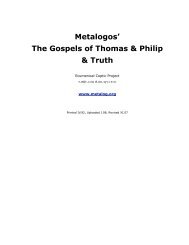Andrew Louth - Syriac Christian Church
Andrew Louth - Syriac Christian Church
Andrew Louth - Syriac Christian Church
Create successful ePaper yourself
Turn your PDF publications into a flip-book with our unique Google optimized e-Paper software.
64 INTRODUCTION<br />
original equality as, through the Word of God, they again<br />
contemplated with all their powers the one God. ‘For the end,’ as<br />
Origen repeatedly stated, ‘is always like the beginning.’ 8<br />
MAXIMUS’ CORRECTION OF ORIGENISM<br />
As we have seen, Origenism retained its following among the more<br />
intellectual Greek monks, despite the condemnations of the sixth<br />
century, and much of Maximus’ effort in his earlier Ambigua is<br />
directed to meeting the challenge of this kind of cosmic theology.<br />
Ultimately, Maximus’ response is to develop a more adequate cosmic<br />
theology of his own, or rather to draw out of the riches of the Orthodox<br />
theological tradition the true cosmic theology that Origenism had<br />
distorted. There are several strands in Maximus’ thinking here. Some<br />
are quite technical and philosophical: Origenism is wrong, in part,<br />
because it has an inaccurate analysis of the way things are. Here<br />
Maximus corrects, but often (indeed usually) corrects very gently: he<br />
retains much of the language and concepts of Origenism but corrects<br />
it by thinking it through again. He draws the Origenist monks into his<br />
way of thinking, he does not simply refute their ideas. And perhaps<br />
the deepest reason for this is that Maximus shares many of the<br />
concerns of Origenist monks: like them he sees the cosmos as an<br />
environment of God’s loving care, his providence, so that to return to<br />
unity and contemplation is to fulfil the nature of rational creatures<br />
within the cosmos. Like them, he thinks that understanding —<br />
philosophical understanding—matters. But unlike them (perhaps: we<br />
have no very clear idea about these ‘Origenist’ monks9 ), he rejects<br />
their intellectualism and develops an understanding of the cosmos to<br />
which the Incarnate Word is central.<br />
Much has been written on Maximus’ correction of Origenism. Here I<br />
shall only sketch in a few important points: precisely because of the<br />
care Maximus takes in rethinking Origenism a full understanding of<br />
what he achieved would demand a detailed analysis that would be out<br />
of place in such an introduction as this. 10 But perhaps the most<br />
fundamental revision Maximus demanded of the Origenist cosmology<br />
concerned its conviction that originally there had been a state of<br />
perfection, of rest, from which the rational beings fell (and to which<br />
they would eventually be restored). This could be stated concisely as a<br />
triad: becoming-rest-movement. Rational beings become (that is, come<br />
to be), they first enjoyed a state of rest and contemplation, they fell<br />
and initiated movement. For Maximus this triad has to be replaced by<br />
another: becoming-movement-rest. This, for Maximus, much more<br />
accurately captures the condition of created beings. First, they come to<br />
be. This is itself a change, a form of movement, so becoming




